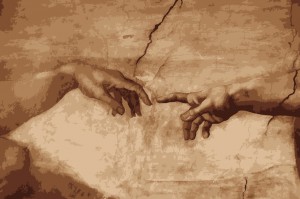Do You Believe in Atheists Who Believe in God?
The definition of an atheist is someone who lacks a belief in any kind of deity. Alternately, an atheist could be defined as someone who asserts that no kind of deity exists. With either definition in mind, how did the Pew Religious Landscape Survey discover that one in five self-identified atheists believe in God?
In a November 4 article for Religion News Service (RNS), Tobin Grant attempts to reconcile these findings with what atheism means, acknowledging first that the term “atheism” may mean something different to individual people and that their personal definition may not fit the conventional understanding of the term. For instance, someone may take an active dislike to institutionalized religion but believe in some sort of higher power, and may adopt the label “atheist” as a kind of protest against the bureaucracy and dogma that she or he associates with traditional faiths. Grant also considers the possibility that some survey respondents may consider themselves atheists but use the term “God” to refer to abstract laws of nature or the principles of the universe. Additionally, the article recognizes that issues of personal belief or nonbelief are often complex and cannot be communicated through simple survey options. An atheist might acknowledge that there is a social construction of an all-powerful being referred to as “God” without believing that this being objectively exists outside of society’s conception of it. However, this intricate view is difficult to convey in a survey response.
Grant’s analysis demonstrates that if atheism is a lack of belief in a deity or an assertion that there is no deity, then the deity being denied requires a definition as well. For example, when the term “atheist” was first used by the ancient Romans, who were polytheists, it referred to people who believed in foreign gods. By this understanding of atheism, someone could easily be both an atheist and a theist simultaneously. However, this meaning is far from atheism as it is recognized now. To fully understand how someone today might be able to reconcile the identity of atheism with belief in a higher power, using the philosophical concepts of “narrow atheism” and “wide atheism” might be helpful.
Someone who fits into the category of narrow atheism does not believe in God, in the sense of the term “God” as it is commonly thought of in Western culture. A narrow atheist might reject an omnipotent, omniscient, omnipresent God, such as the deities envisioned in Christianity, Judaism, and Islam. However, a narrow atheist might still believe in some sort of higher power, whether that is natural laws of science or the sense of awe that she or he feels when contemplating the vastness of the universe. A narrow atheist may even have some sense of a spiritual being or realm, though he or she might not define this higher power in a way that the larger society typically thinks of “God.” A wide atheist, however, rejects any concept of the supernatural, whether it’s a deity or a higher power. From the perspective of a wide atheist, there is no paranormal being or beings that exist beyond the material universe. Individuals who identify as wide atheists certainly can still feel a sense of wonder when encountering the complexity and beauty of the natural world, but they would not consider this sense of reverence a connection with a higher power beyond the physical realm.
The findings from the Pew Religious Landscape survey demonstrate that “atheist” is still a label that is somewhat in flux. In a society dominated by religion, nonreligious individuals may still struggle to define themselves. How one chooses to identify can also be deeply personal, and what “atheism” means to one individual may be slightly different to another. However, this does not mean that many different types of atheists can’t come together around issues that are important to all secular people. No matter what atheism means to each of us, we can probably all agree that we’re better off when the separation of church and state is protected and our civil rights as nontheists are upheld.

